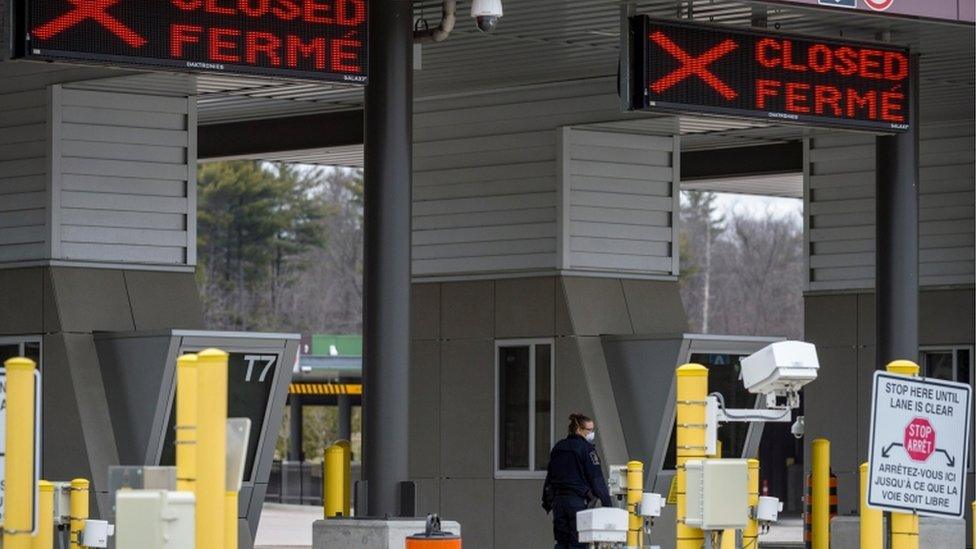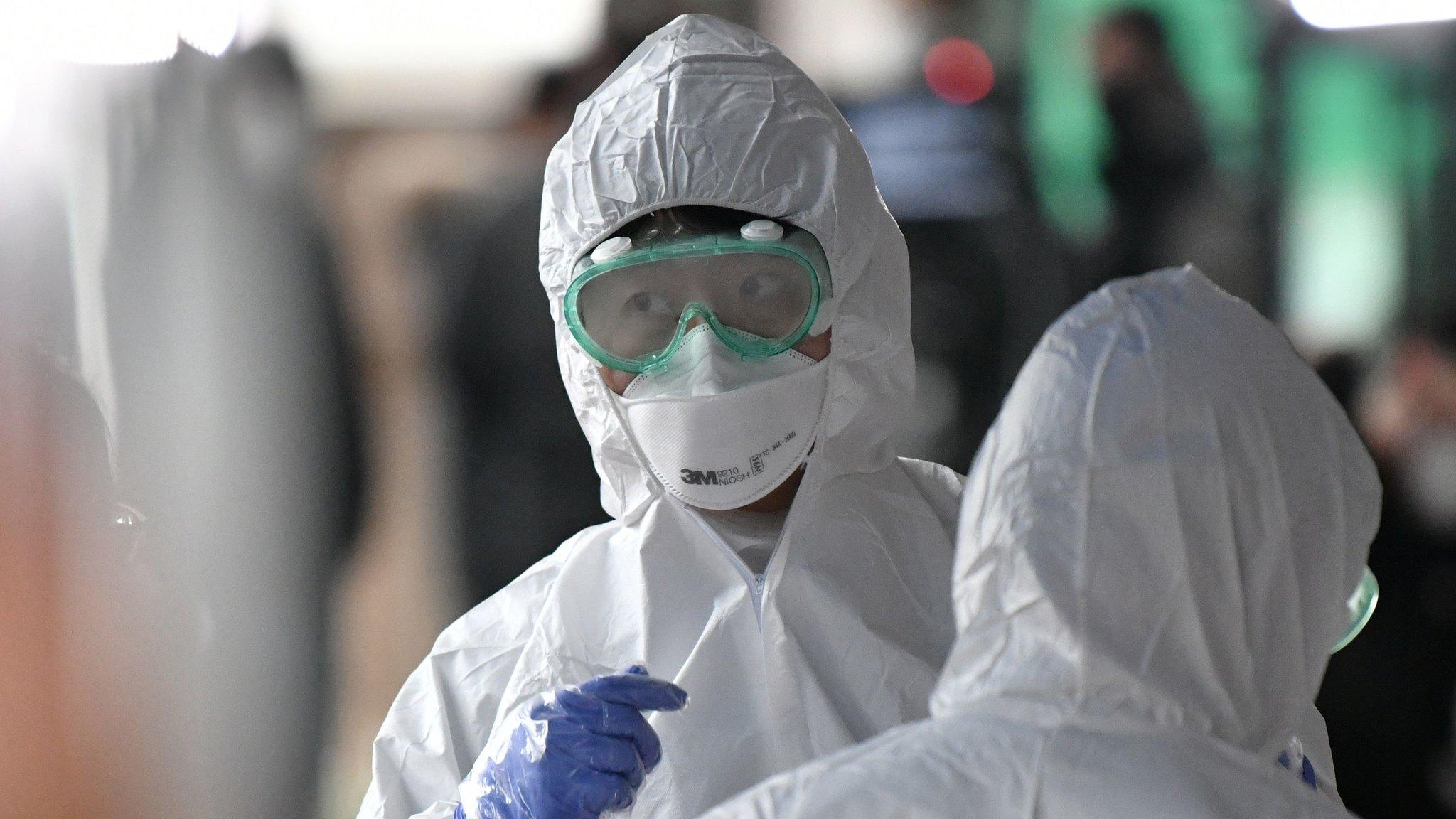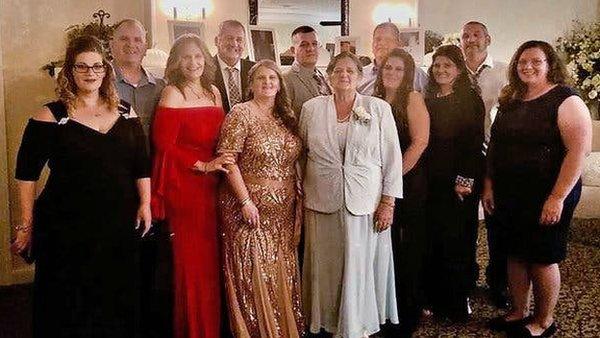Trump says coronavirus not Asian Americans' fault
- Published
"Uh oh" - Trump backs away from task force leader
US President Donald Trump - under fire for labelling Covid-19 the "Chinese virus" - has said Asian Americans should not be blamed for the outbreak.
He said it is "very important that we totally protect" Asian Americans, whom he praised as "amazing people".
Mr Trump spoke out amid rising reports of verbal and physical attacks on the community amid the pandemic.
Coronavirus is still spreading in the US, which currently has more than 43,000 confirmed cases and 533 deaths.
At a White House coronavirus task force news conference on Monday, Mr Trump said: "It is very important that we totally protect our Asian American community in the United States and all around the world.
"They're amazing people and the spreading of the virus is not their fault in any way, shape or form.
"They're working closely with us to get rid of it - we will prevail together."
Asked by a reporter why he had spoken out, Mr Trump said: "It seems that there could be a little bit of nasty language toward the Asian Americans in our country and I don't like that at all.
"These are incredible people, they love our country and I'm not going to let it happen."

A SIMPLE GUIDE: What are the symptoms?
AVOIDING CONTACT: Should I self-isolate?
MAPS AND CHARTS: Visual guide to the outbreak
VIDEO: The 20-second hand wash

During press conferences last week, Mr Trump used the term "China virus" and "Chinese virus", rejecting suggestions from reporters that the term was racist.
"It comes from China," Mr Trump said then. "It's not racist at all."
The World Health Organization has issued guidance against "stigmatising certain communities" when naming illnesses.
US lawmaker Judy Chu - a California Democrat and chairwoman of the Congressional Asian Pacific American Caucus - was not impressed by Mr Trump's remarks.
She told NBC News his comments would not "be necessary if he and his supporters had not already endangered so many by spreading this toxic xenophobia".
Last week, President Trump was grilled on use of term 'Chinese virus'

From 'Chinese virus' to 'amazing people'
Analysis by Zhaoyin Feng, BBC News Chinese, Washington
In describing Covid-19 as the "Chinese virus", Mr Trump has been accused of attempting to deflect scrutiny for his domestic handling of the crisis on to external factors.
Despite mounting criticism from China and Asian Americans, the president and several high-ranking US officials have continued to use the term.
Other than potentially stigmatising Asian-Americans, Mr Trump's "Chinese virus" label could turn out to be a self-inflicted wound in the 2020 presidential election.
Asian Americans are the fastest growing racial group in the US. According to recent surveys, the community's voters have increasingly leaned Democratic in the past few years, and they are becoming influential in electoral battleground districts.
Even as he lavished praise on Asian Americans on Monday, the president was accused of breaking fences, rather than mending them.
"They [Asian Americans] are working closely with us to get rid of it [virus]," he tweeted, leading some observers to take offence at the "they/us" dichotomy.

What's the latest in the US?
On the day that Britain announced a national lockdown to combat the virus, Mr Trump announced: "America will again and soon be open for business."
New York Governor Andrew Cuomo appeared to suggest the president was putting the country's economic well-being ahead of its public health, tweeting: "You cannot put a value on human life."
The US is currently in the middle of 15 days of social distancing. Despite the president's signal that he was inclined to ease restrictions, state by state the nation was tightening lockdown measures.
On Monday, Washington, Ohio, Louisiana, Oregon, Michigan, Indiana and Massachusetts became the latest to issue "stay at home" orders for residents.
Wisconsin, Delaware and New Mexico will follow suit on Tuesday, taking the total number of states withdrawing behind closed doors to well over a dozen.
These orders will affect about one in three Americans - more than 100 million people.
Reality Check tackles misleading health advice being shared online
Maryland stopped short on Monday of a "stay at home" order, instead joining several other states that have closed all non-essential businesses.
Neighbouring Virginia closed schools for the rest of the academic year.
The US now has the third highest number of cases in the world, behind Italy and China.
Half of America's total caseload is in New York state, which has recorded more than 20,000 positive tests and 157 deaths.
US National Guard troops are helping to distribute food and medical supplies across the country.
The homeland military force's leader, General Joseph Lengyel, described the situation as like having "54 different hurricanes hitting every state".
US students on spring break defy COVID-19 warnings
As state officials clamour for aid, Defence Secretary Mark Esper on Monday said the US military "can't meet everybody's needs".
Mr Esper said the Pentagon was working to send field hospitals to support the hard-hit cities of New York and Seattle.
On Monday, the top US public health official, Surgeon General Dr Jerome Adams, said: "I want America to understand this week it's going to get bad."
He noted on the NBC morning show Today that young people were ignoring guidance to practise social distancing.
The University of Tampa in Florida said that at least five students who ignored social distancing advice to party on spring break had since tested positive for Covid-19.
A man from Phoenix, Arizona, is dead and his wife is in a critical condition after the couple ingested chloroquine phosphate - a substance used to clean fish tanks that is similar to a drug touted by President Trump as a possible treatment for coronavirus.
Chloroquine is approved by the US Food and Drug Administration for treating malaria, but it is not authorised as a medication for Covid-19.

- Published21 March 2020

- Published21 March 2020

- Published20 March 2020
